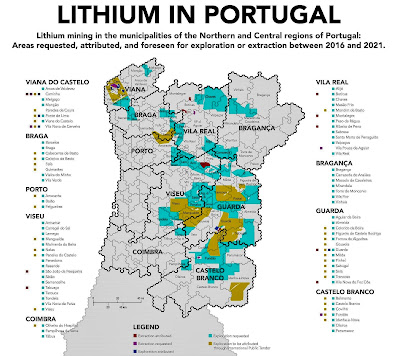It is possible that one of the most important hubs for the manufacturing of batteries for electric vehicles may emerge in the vicinity of a significant lithium deposit.
In recognition of its hue and the fact that this metal will become more important in the race to electrify transportation, it has been dubbed "white gold" or "white gasoline" by the media. Yes, since lithium will be used in some capacity to propel our automobiles in the future, such as after the EU mandated end to the manufacturing of cars with internal combustion engines in 2035, when electric vehicles will take over as the primary mode of transportation. However, there is a problem: this metal is difficult to come by in Europe, and the extraction process is much more difficult to master. Portugal is an example of a problem that an EU nation might fix.
For many years, the city of Lisbon has found that it has a buried treasure, notably in the northern and eastern regions near the Spanish border. Savannah Resources, a London-based company that has been developing lithium mines in Portugal since 2017, made a significant investment in this resource. It has been discovered that Savannah Resources has obtained exploration permits from the government and has already carried out exploration activities that have allowed it to identify large deposits of lithium-bearing spodumene minerals containing approximately 287,500 tons of this precious metal in the Covas do Barroso area, which is located north-east of Porto. The plan is to develop a 542-hectare open pit mine (composed of four quarries), which would be the biggest in Europe if it were to be built. Large enough to create the batteries for 700,000 electric cars every year, according to estimates.
This is a once-in-a-lifetime chance for Portugal, but also for the European Union, to lessen its reliance on lithium supplied from overseas, particularly from China, which now controls 40% of the world's lithium output. The EU's portion of the global economy remains stuck at at 3 percent, but Brussels has set itself the lofty aim of obtaining a 25 percent share by 2030. This is one of the reasons why Portuguese white gold is so enticing. Despite the fact that extraction has not yet begun (we are talking about the year 2024 as the commencement date), private and governmental investments are beginning to manifest themselves on the horizon. It has already been announced that the Swedish business Northvolt and the Portuguese oil giant Galp will form a joint venture to construct a facility that would convert lithium into batteries, thereby adding another link to the supply chain.
Initially, it seems to be a fantastic chance for the future of a nation that has just emerged from decades of severe economic catastrophe. However, not all Portuguese raise a glass to white gold. Concerns have been expressed by local farmers and environmentalists, such as the Mining Watch group, regarding the mine's potential consequences. According to Nos Nelson Gomes, an agricultural entrepreneur from Covas do Barroso, the extraction of lithium takes place at a depth ranging between one hundred and three hundred meters, resulting in slag and big craters in the terrain as a result of the process. Tons of stone must be crushed in order to complete the operation, resulting in a dust storm in the surrounding region. There is also concern that the water supplies may become depleted.
However, the villagers' protestations have so far had little impact, despite the fact that the release of the concessions is moving at an agonizingly slow pace as a result of many objections. On the map, Gomes depicts the region of the forest where the land is to be dug up. In Gomes' words, "the strategy we're following for obtaining this lithium is the same one we're following for extracting fossil fuels." "We will continue to devastate ecosystems as a result of our actions. We are harming the lives of the people who reside in this area by our actions. Our consumption continues when we should be consuming less "he continues.
However, not everyone shares the pessimism expressed by local farmers and environmentalists about the impending doom. "There isn't any dispute about that. Portugal has the greatest European deposits of lithium, which is critical to the industry's operations. This is encouraging news. I consider it essential news when anything happens that prevents Europe from being reliant on minerals that would otherwise have to be imported from elsewhere "Professor of geology at the University of Porto, Alexandre Lima, explains the situation. Reserves around Covas do Barroso have been mapped by Lima throughout the last several years. According to him, the lithium mine in the vicinity should be operational. "We will be able to get the resources required for the European energy transition in this manner. Life in Europe will be terrible if this shift does not occur "he continues. According to the professor, lithium can be mined in a safe manner. "As a customer who owns an electric vehicle, I will be more at ease if the raw materials for my vehicle are sourced from a region where social and environmental standards are strictly enforced, such as Europe. More favorable than in nations such as China, where there is a great deal of pollution and workers' rights are non-existent "He comes to a conclusion.

